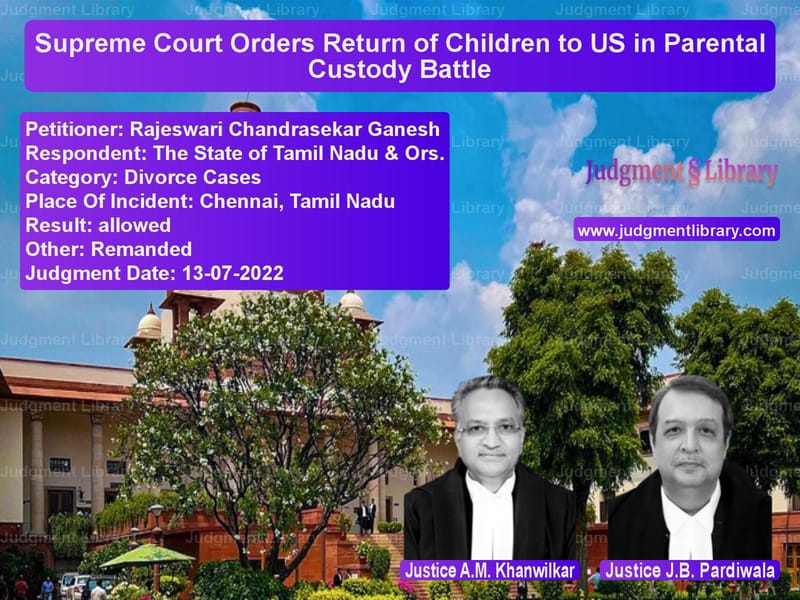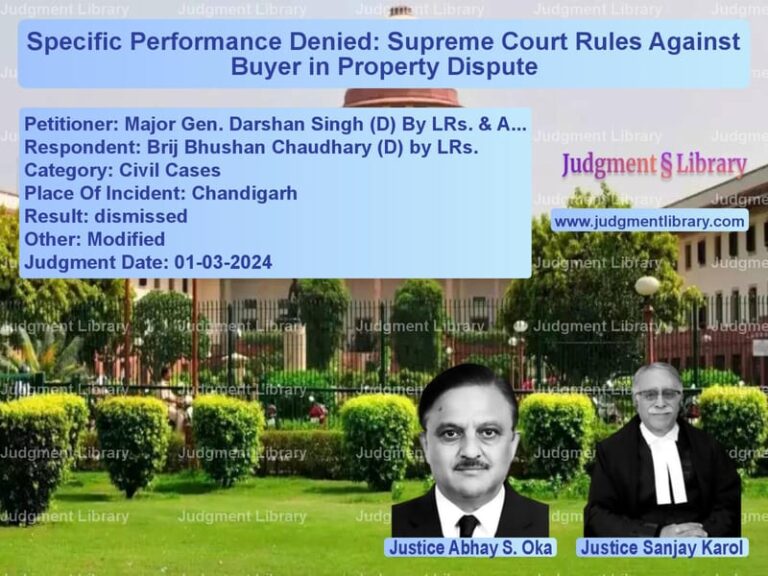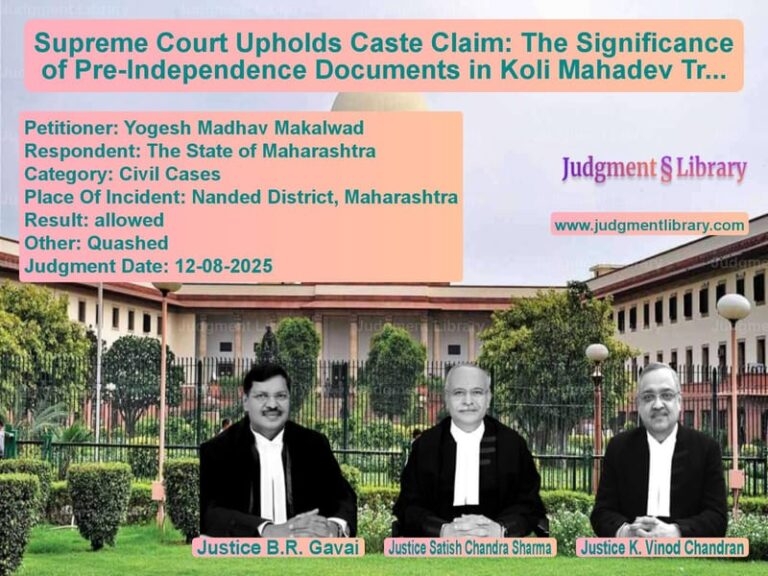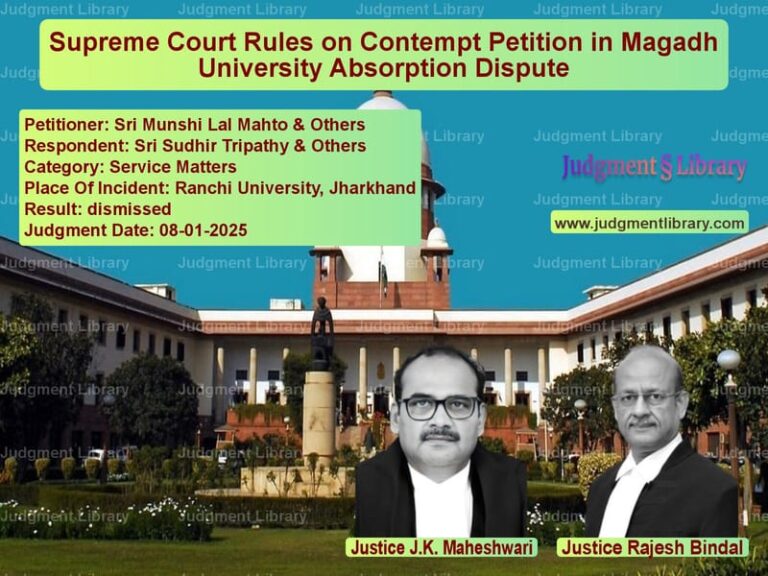Supreme Court Orders Return of Children to US in Parental Custody Battle
The case of Rajeswari Chandrasekar Ganesh vs. The State of Tamil Nadu & Ors. is a significant ruling on parental custody disputes in international scenarios. The Supreme Court’s decision, delivered by a bench comprising A.M. Khanwilkar and J.B. Pardiwala, settled the legal question of whether children removed from the United States by one parent should be returned in compliance with foreign court orders.
Background of the Case
The dispute arose between the petitioner-mother and the respondent-father regarding the custody of their two minor children, Lakshaya Ganesh and Bhavin Sai Ganesh. The couple married in 2008 in Chennai and subsequently moved to the United States, where their children were born and raised. The children were naturalized U.S. citizens and had been residing in Ohio before the father, without the mother’s consent, brought them to India in August 2021.
The mother, who was awarded legal custody by an Ohio court under a shared parenting plan, filed a habeas corpus petition before the Supreme Court of India, demanding the return of her children.
Legal Issues in the Case
- Was the removal of the children from the United States by the father legal?
- Should the Supreme Court of India enforce the U.S. court’s custody order?
- Did the best interests of the children favor returning them to the U.S.?
- Can the father claim jurisdiction under Indian laws since India is not a signatory to the Hague Convention on Child Abduction?
Arguments by the Petitioner-Mother
- The father abducted the children in violation of the shared parenting plan approved by the U.S. court.
- Both children were accustomed to life in the U.S., including their school, friends, and cultural environment.
- The children’s education and psychological well-being were at risk due to sudden relocation.
- The U.S. court was the competent jurisdiction for deciding custody issues.
- The father was using the children as a tool of vengeance in a parental dispute.
Arguments by the Respondent-Father
- India is not a signatory to the Hague Convention, and the U.S. court’s order was not binding in India.
- The children were now settled in India, attending a good school in Chennai.
- The mother had mental health issues, making her unfit for sole custody.
- The father had lost his U.S. work visa, making it difficult to return.
- The best interests of the children should be prioritized over foreign court orders.
Supreme Court’s Observations
- The best interests of the children were paramount.
- The children had been unlawfully removed from the U.S. in violation of court orders.
- The father had misled authorities by providing incorrect travel itineraries.
- Returning the children to their habitual residence was in their welfare.
- The mother had stable employment and could support the children’s upbringing.
The Court ruled:
“The respondent no.2 shall immediately apply for a visa and return to the USA with both minor children to comply with the shared parenting plan as ordered by the Court at Ohio.”
Final Judgment
The Supreme Court issued the following directives:
- The father must apply for a U.S. visa within one week.
- If the visa is granted, he must travel back to the U.S. with the children.
- If the visa is denied, the mother shall travel to India to take the children back to the U.S.
- The father and his family must cooperate and not create any impediments.
- The mother may seek assistance from local police if necessary to retrieve the children.
Implications of the Judgment
- The ruling reinforces the principle that international custody disputes should be resolved based on existing court orders.
- It establishes that the welfare of children takes precedence over parental rights.
- The decision strengthens legal recourse for parents facing child abduction by a spouse.
- The judgment underscores India’s commitment to international legal principles despite not being a signatory to the Hague Convention.
This landmark judgment ensures that the rights of children are upheld and that parents cannot unilaterally violate international custody agreements.
Petitioner Name: Rajeswari Chandrasekar Ganesh.Respondent Name: The State of Tamil Nadu & Ors..Judgment By: Justice A.M. Khanwilkar, Justice J.B. Pardiwala.Place Of Incident: Chennai, Tamil Nadu.Judgment Date: 13-07-2022.
Don’t miss out on the full details! Download the complete judgment in PDF format below and gain valuable insights instantly!
Download Judgment: rajeswari-chandrasek-vs-the-state-of-tamil-n-supreme-court-of-india-judgment-dated-13-07-2022.pdf
Directly Download Judgment: Directly download this Judgment
See all petitions in Child Custody
See all petitions in Divorce by Desertion
See all petitions in Judgment by A M Khanwilkar
See all petitions in Judgment by J.B. Pardiwala
See all petitions in allowed
See all petitions in Remanded
See all petitions in supreme court of India judgments July 2022
See all petitions in 2022 judgments
See all posts in Divorce Cases Category
See all allowed petitions in Divorce Cases Category
See all Dismissed petitions in Divorce Cases Category
See all partially allowed petitions in Divorce Cases Category







